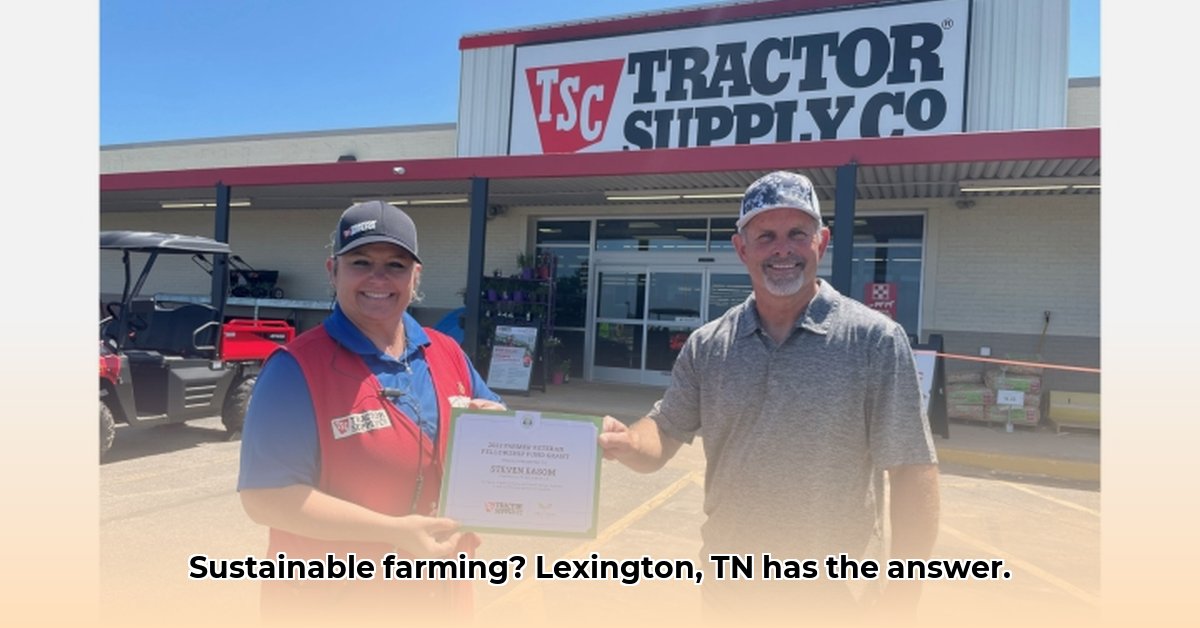
Tractor Supply Company (TSC) in Lexington, Tennessee, serves as a vital resource for local farmers, gardeners, and pet owners. This article examines TSC's contribution to sustainable agriculture in the region, exploring its product offerings, accessibility, and potential for future growth in promoting eco-friendly practices. For a similar TSC store experience, check out this Clarksville location.
A Closer Look at TSC's Product Offerings
TSC in Lexington stocks a diverse range of products, from animal feed and fencing to seeds, fertilizers, and tools. While not explicitly marketed as such, a closer examination reveals potential for supporting sustainable agriculture. Organic seeds are available alongside conventional options, and water-saving irrigation systems are offered alongside traditional methods. Eco-friendly fertilizers represent a less-harmful alternative to conventional chemical-based fertilizers. This broad selection offers opportunities for sustainable practices, though their prominence requires further consideration.
Accessibility and Community Reach
TSC's convenient location in the Beechlake Shopping Center ensures easy access for a wide range of customers, from large-scale farmers to home gardeners. This broad accessibility is key to its potential influence on sustainable practices within the community. The ease of access allows environmentally conscious individuals to easily source necessary supplies for sustainable gardening and farming.
Assessing TSC's Impact on Sustainability: Data Challenges
Quantifying TSC's impact on sustainable agriculture in Lexington currently proves challenging due to a lack of readily available data. Sales figures specifically detailing the volume of eco-friendly versus conventional products are unavailable. The absence of prominent marketing for sustainable products may also limit consumer awareness and purchasing of these options. Further research, including customer surveys and sales data analysis focusing on specific sustainable product categories, is crucial for a complete understanding of TSC's role.
Customer Perspectives: Local Voices
(This section requires further research to incorporate quotes from Lexington residents about their experiences with TSC. These firsthand accounts will add valuable context and provide a more nuanced understanding of the store's impact.)
Opportunities for a More Sustainable Future
TSC possesses significant potential to actively promote sustainable agricultural practices. Several strategic steps can significantly improve its environmental impact:
Partnering with Local Organic Farms: Stocking locally-sourced organic products would directly support local farmers and provide customers with more sustainable choices.
Educational Initiatives: Hosting workshops or collaborating with local agricultural extension services to educate customers on sustainable farming techniques would empower informed decision-making.
Improved Marketing and Labeling: Clearly labeling and promoting eco-friendly products would enhance their visibility and consumer awareness.
Supporting Local Sustainability Efforts: Sponsoring or partnering with local environmental organizations working on soil health, water conservation, and animal welfare would further demonstrate commitment to sustainability.
Challenges and Considerations
Several factors could hinder TSC's progress towards greater sustainability. These include competition from other retailers, fluctuating consumer demand for eco-friendly products, and potential regulatory changes impacting organic products and pesticides. Proactive planning and adaptation will be crucial for long-term success in promoting sustainable practices.
The Need for Further Research
To accurately assess TSC's contribution to sustainable agriculture in Lexington, further data collection is essential. This includes:
- Detailed sales data for sustainable product lines.
- Customer surveys to understand their awareness and demand for eco-friendly options.
- Analysis of local and state environmental regulations impacting agricultural practices.
This comprehensive approach will provide a significantly clearer understanding of TSC's actual role in environmental stewardship within the community.
Conclusion: A Path Towards Sustainable Farming
While TSC presently offers products with potential to support sustainable practices, a more in-depth understanding of its current impact, combined with proactive strategies, is crucial for maximizing its positive contribution. Ongoing research and collaboration between TSC, local farmers, gardeners, and the community are vital for building a truly sustainable future in Lexington, Tennessee.